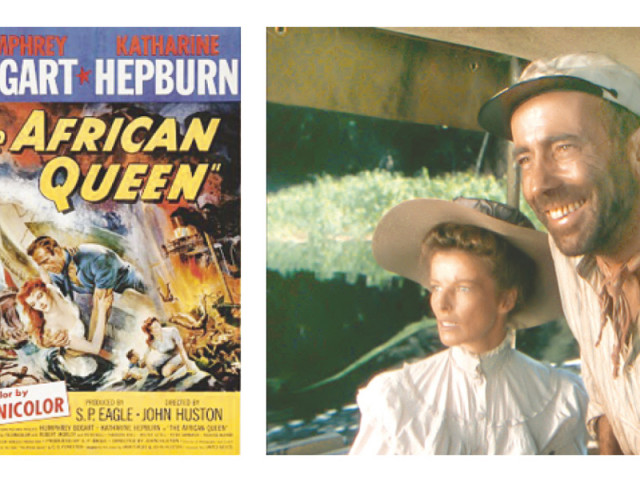Film review: Lesson in patriotic propaganda from the 1950s
Oscar-winning ‘The African Queen’ to be screened at Safma today.

Film review: Lesson in patriotic propaganda from the 1950s
Director John Huston’s 1951 film The African Queen, starring Humphrey Bogart and Katharine Hepburn is being privately screened at SAFMA Media Centre on Friday.
The film was adapted from the novel of the same name, written by C S Forester in 1935. James Agee changed the text for adjustment in the screenplay, which reflects his side of a seasoned writer. Many objections to the several aspects of the original novel were accommodated, including the pre-marital relations of the couple.
The setting for the film is in a village in German East Africa during World War I where Rose Sayer (Katharine Hepburn) works as a missionary along with her brother. They are visited by Charlie Allnut (Humphrey Bogart) who is an uncultured Canadian boatman, owner of the African Queen. They tolerate his disagreeable habits because of his being their sole contact with the outside world. He usually brings their mail and food items. One day he comes with the news that a war has started between England and Germany.
After ransacking and burning of the village and the church by the German Army and death of her brother, Rose decides to accompany Allnut on his boat. Going through the rapids, a forest of reeds and gunfire and finding their way to the lake they develop a comradeship. This comradeship ultimately develops into love when, in a moment of happiness, Rose finds herself in Allnut’s arms.
Her love for the motherland is replaced by a love for the Methodist Church of England which leads to the idea of destroying the German warship Louisa by torpedoing it. They ultimately succeed in this mission by using various tools and explosives in the boat. There are certain miraculous developments leading towards the marriage of the couple, which perhaps were not questioned in the early 50s of the last century by the viewers.
There are only two main characters in the film, therefore the camera mostly remains focused on Humphrey Bogart and Katharine Hepburn, capturing their different moods. Humphrey Bogart got an Academy Award for best lead actor in the film. Bogart considered his performance to be his career’s best in the film and Katharine also endorsed his views.
Though he is considered to be the greatest star of motion pictures, Bogart was unable to win any other Academy Award. Later he was endowed with Humphrey Bogart’s star on the Hollywood walk of fame.
Hepburn is articulate and lives up to the demand of the character in the film. Through her career, she won four of the 12 Oscars she was nominated for - a record. Her Oscar-winning performances were in In Morning Glory (1933), Guess Who’s Coming to Dinner (1967), The Lion in Winter (1968), and On Golden Pond (1981). In 1999 she was ranked by the American Film Institute as the greatest female film star in the history of American Cinema.
Like all other films on World War I or II, there is a hackneyed glorification of the British deeds through characters and incidents. In this film also the Germans are demonized and portrayed as ruthless and brutal, caring not even for the places of worship, which betrays the bias of the filmmakers. Movies from this era rarely come up with atrocities unleashed by the British, Spaniards and Portuguese colonialists on the people of Asia, Africa and Latin America.
Published in The Express Tribune, April 15th, 2011.



















COMMENTS
Comments are moderated and generally will be posted if they are on-topic and not abusive.
For more information, please see our Comments FAQ